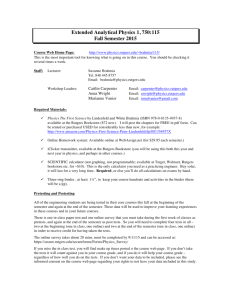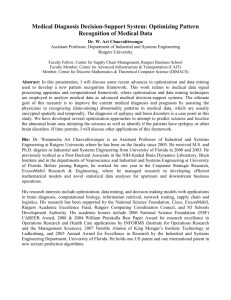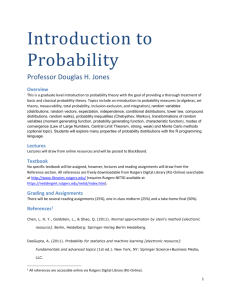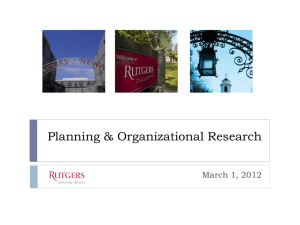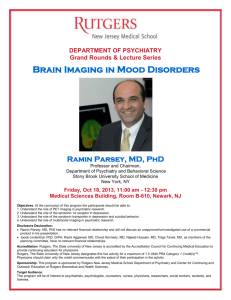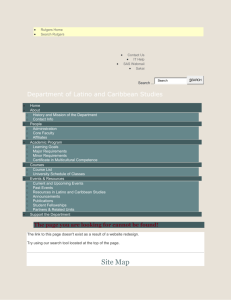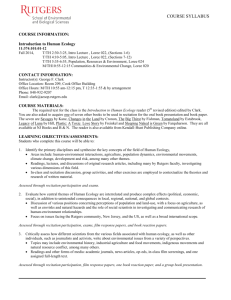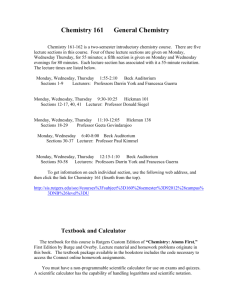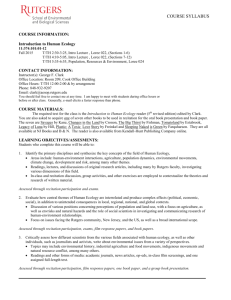Extended Analytical Physics 1, 750:116 Spring Semester 2012
advertisement
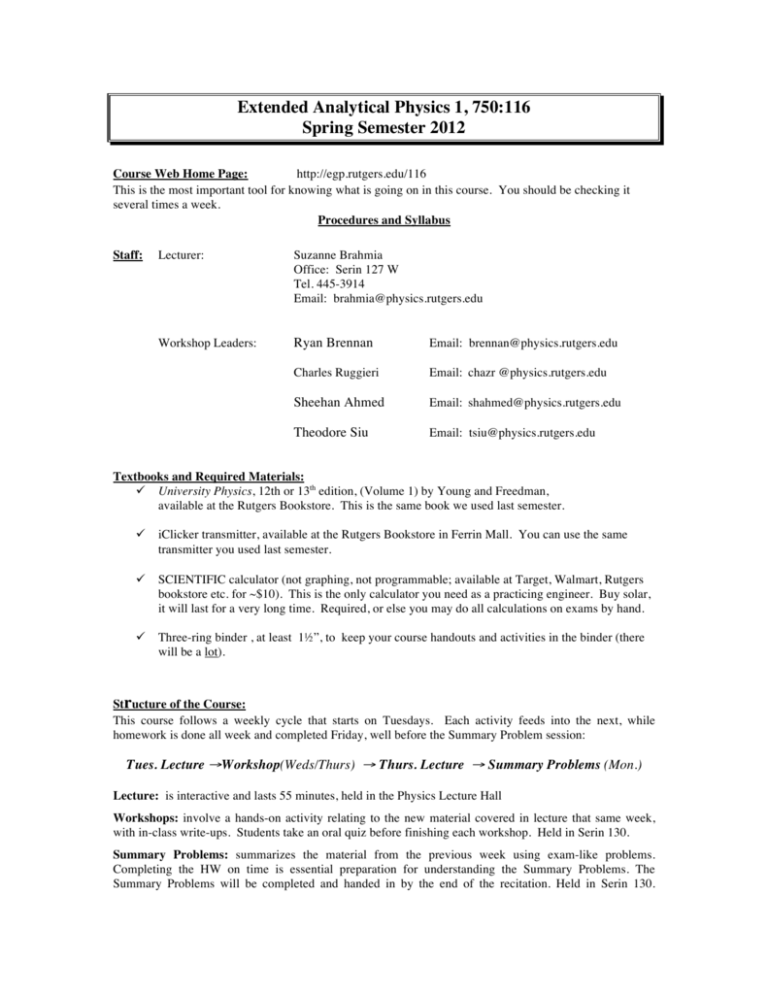
Extended Analytical Physics 1, 750:116 Spring Semester 2012 Course Web Home Page: http://egp.rutgers.edu/116 This is the most important tool for knowing what is going on in this course. You should be checking it several times a week. Procedures and Syllabus Staff: Lecturer: Suzanne Brahmia Office: Serin 127 W Tel. 445-3914 Email: brahmia@physics.rutgers.edu Workshop Leaders: Ryan Brennan Email: brennan@physics.rutgers.edu Charles Ruggieri Email: chazr @physics.rutgers.edu Sheehan Ahmed Email: shahmed@physics.rutgers.edu Theodore Siu Email: tsiu@physics.rutgers.edu Textbooks and Required Materials: University Physics, 12th or 13th edition, (Volume 1) by Young and Freedman, available at the Rutgers Bookstore. This is the same book we used last semester. iClicker transmitter, available at the Rutgers Bookstore in Ferrin Mall. You can use the same transmitter you used last semester. SCIENTIFIC calculator (not graphing, not programmable; available at Target, Walmart, Rutgers bookstore etc. for ~$10). This is the only calculator you need as a practicing engineer. Buy solar, it will last for a very long time. Required, or else you may do all calculations on exams by hand. Three-ring binder , at least 1½”, to keep your course handouts and activities in the binder (there will be a lot). Structure of the Course: This course follows a weekly cycle that starts on Tuesdays. Each activity feeds into the next, while homework is done all week and completed Friday, well before the Summary Problem session: Tues. Lecture →Workshop(Weds/Thurs) → Thurs. Lecture → Summary Problems (Mon.) Lecture: is interactive and lasts 55 minutes, held in the Physics Lecture Hall Workshops: involve a hands-on activity relating to the new material covered in lecture that same week, with in-class write-ups. Students take an oral quiz before finishing each workshop. Held in Serin 130. Summary Problems: summarizes the material from the previous week using exam-like problems. Completing the HW on time is essential preparation for understanding the Summary Problems. The Summary Problems will be completed and handed in by the end of the recitation. Held in Serin 130. Workshop Meeting Times: (Serin W130) Section # R1 R2 R3 R4 R5 R6 R7 R8 Days M Th M Th MW MW MW MW MW M Th Period 2 3 4 5 6 7 8 1 Instructor Charles Ruggieri Ryan Brennan Charles Ruggieri Ryan Brennan Theodore Siu Sheehan Ahmed Sheehan Ahmed Theodore Siu Lecture: Coming prepared to lecture is required for this course. Preparation means completing the required reading before Tuesday lectures. The lectures are interactive. You are required to purchase an iClicker transmitter in order to participate in lecture; a portion of your course grade is determined by your presence in lecture. Reading Assignments: The reading and homework assignments are all in Young and Freedman Not all of the text is assigned reading. It is assumed that you will have read the assigned material before Tuesday's lectures. There will be a reading quiz in lecture every Tuesday. If you are late or miss class you will receive a zero. Reading quizzes cannot be made up, so the lowest 3 reading quiz grades will be dropped at the end of the semester to allow for the occasional mishap. Homework and Office Hours: Physics is a problem-based discipline, you must do the homework in order to learn the material. The textbook homework assignments should be started during the week in which the material is discussed in lecture. This homework will be submitted via the internet at: http://www.masteringphysics.com The course staff will hold office hours during the week in ARC 332. Please come and get any questions you have answered; this time is your time. Instructor’s office hours are posted on the course website. We will not be using recitation time to go over homework, it is your responsibility to seek help on the homework during office hours. You are welcome to attend the office hours of ANY instructor to get help. The homework is due electronically; the deadline is Friday at 11:59 PM (but can be submitted anytime before then). NO HOMEWORK WILL BE ACCEPTED LATE. Summary Problem Session: The first section meeting of the week is called the Summary Problem session. In this session you will be working on problems that summarize the previous week’s work. You can make up missed Summary Problems on the same Monday (only) during any other regularly scheduled recitation meeting. These problems cannot be made up after Monday but the lowest score will be dropped when calculating your final grade. In general, at least 30% of the exam questions are based on the Summary problem activities. Workshop: The second recitation meeting of the week is called the Workshop Activity session. In the case of emergency you can make up a missed Workshop the same week during a different recitation, but it is strongly discouraged to miss your regular workshop session. A Workshop cannot be made up after Thursday of the week in which it is assigned, but the lowest score will be dropped when calculating your final grade. In general, at least 30% of the exam questions are based on the Workshop activities. Copying and Cheating: You are encouraged to work with others in this course but the work you turn in must be YOUR work in YOUR words. If the work on your paper is the same as that of anyone else in the class, your College Dean will be notified and you will receive a “0” for the assignment. This means that if someone copies your work or you copy someone’s work, both papers will receive zeros. Grading: Hourly Exams (2): There will be two common hourly exams that will be held in class from 1:40 – 3:00 PM. The maximum score on each exam is 100 points. EXAM POLICY: Bring a pencil and a scientific calculator. You will not be permitted to bring anything else to the exams. The exam formula sheet is available on the course web page and will be provided to you at the exam. Hourly Exam/Oral Presentation Grading Scale: 83-100 77-82 71-76 65-70 60-64 54-59 0-53 Design Practicals and Presentation (1): There are three experimental design practicals during the semester that your group will prepare together in class. At the end of the semester you and your group will prepare a 5 minute oral presentation on one of the design practicals. The design practicals and presentation are graded out of a total of 50 points. Final (1): Maximum score is 200 points, double that of a single hourly exam. The exam policy stated above is also followed for the final exam Recitation Grade (Maximum score 330 points): homework 50 points summary probs 150 points workshops 100 points reading quizzes 15 points participation /office hours 15 points Participation Score: At the end of the semester your TA will award you a participation grade based on your activity and engagement in recitation. This grade also depends on how well you function within your group as a team member. Course Grade: (Maximum 780 points) Course Grading Scale: 647-780 600-646 554-599 508-553 468-507 421-467 0-420 A B+ B C+ C D F A B+ B C+ C D F Be proactive, check out RU student academic support to keep on top of your success… Physics Study Groups: Physics Study Groups are an optional additional weekly meeting. They provide an opportunity to get together with a small group (8-14 students) of like-minded serious students to summarize the week’s material and get any confusion cleared up. Each study group works with one of the Learning Assistants who will collaborate with your professor so that he can better assist the group in • getting organized, • understanding concepts and • getting better-prepared for high stakes midterms and final exams. For more information, see the course web page. The Math and Science Learning Center: The MSLC is an innovative facility to assist students studying physics and related subjects. There you may also obtain copies of past exams, both finals and hourlies, and their solutions. We will hold pre-finals help sessions there, you can come and find your colleagues and get answered any questions you may have. Please visit: http://mslc.rutgers.edu Rutgers Learning Centers: The Rutgers Learning Centers can provide you with assistance with time management, test anxiety, testtaking strategies, or one-on-one tutoring in many subjects. Rutgers Learning Centers Web Home Page: http://lrc.rutgers.edu Students with Disabilities: If you have a disability, you are urged to speak to the course supervisor early in the semester to make the necessary arrangements to support a successful learning experience. Also, you must arrange for the course supervisor to receive a letter from your College's Disabilities Concerns Coordinator verifying that you have a disability. A list of the College Coordinators can be found at: http://www.physics.rutgers.edu/ugrad/disabilities.html
